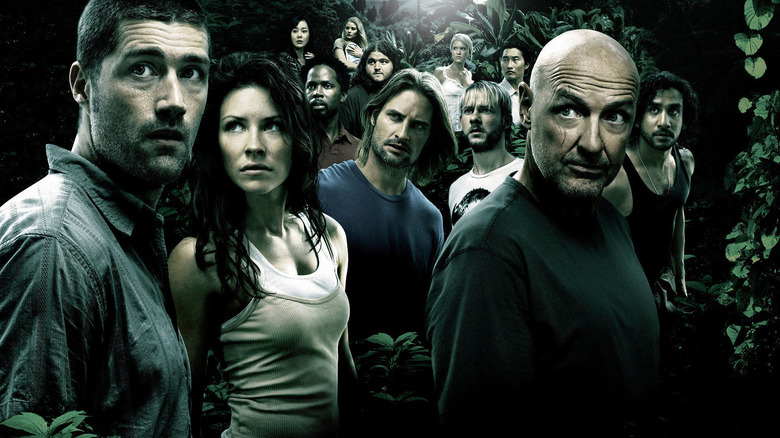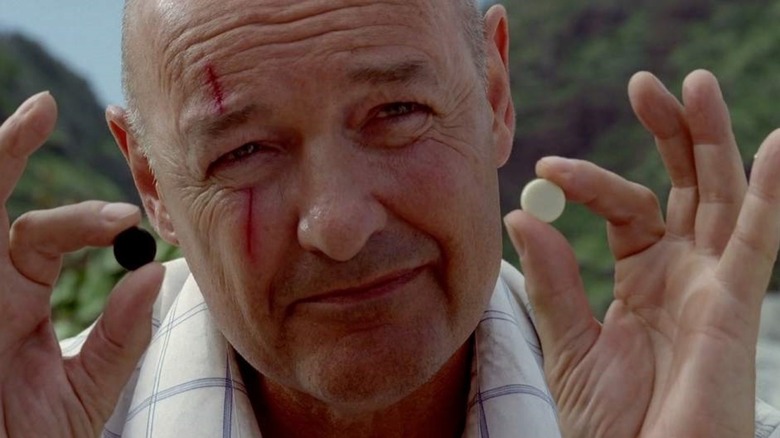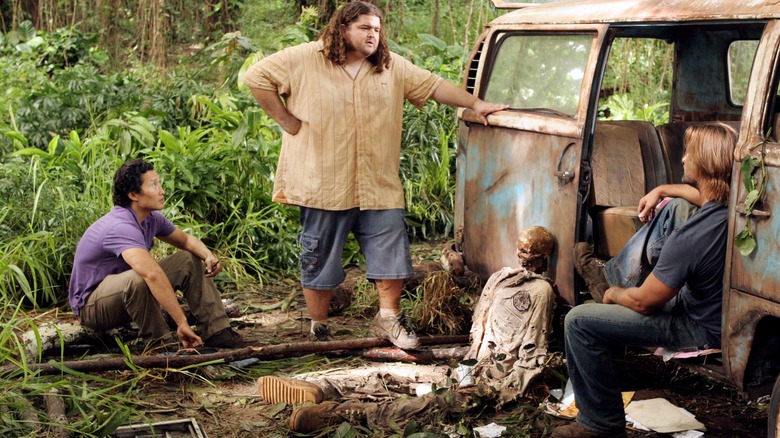One Of The Most Important Shows Of TV's Golden Age Is Now Streaming On Netflix
What do you think of when you think of "Lost"? That bizarre hatch in the middle of the jungle — and everyone's reaction to it — was precisely the kind of plot twists that cable, network, and now streaming television have been trying to recreate ever since the season 1 finale. Or maybe it's the smoke monster that plagued the survivors through countless episodes, a mystery that was finally resolved as an underwhelming afterthought, representing both the highs and lows of stringing viewers along perhaps a bit too long. For many, that controversial and confusing ending is what sticks out the most all these years later, forever existing as a cautionary tale warning against investing in stories that begin with no real ending in mind.
If you ask me, summarizing the phenomenon of "Lost" is less about recalling any specific moment or episode (although merely hearing the words "Not Penny's Boat" might as well be my sleeper agent activation phrase) and more about the utterly unique experience of following this particular series in real time, from beginning to end, during a pivotal moment in the medium's history. When the first season premiered in the fall of 2004, the idea that we were living through a "Golden Age" of television had been taking root in critical circles for years following game-changing works like "The Wire" and "The Sopranos." But what Damon Lindelof and Carlton Cuse created was something else altogether.
A mainstream sensation that hooked viewers right from its two-part pilot episode (perhaps J.J. Abrams' finest directing effort) and only grew in magnitude from there, "Lost" brought prestige-level character work to a storyline as melodramatic and irresistible as any daytime soap. Now, 20 years after its debut, there's a certain irony in this series finally coming to Netflix, of all streamers.
The true appeal of Lost
"Lost" was always a show about choices — to understand that is to understand why we're still here talking about this series all these years later. The first and most important of those choices was made by creators Lindelof and Cuse, when they took what could've been a straightforward survivor story following passengers of a doomed airliner that crash lands on a mysterious island containing untold amounts of secrets and, instead, made it into a sprawling mythology that cared just as much about the individuals at its heart as the unanswered questions dangling over all our heads. The flashback structure gave us crucial insights into personalities like Jack Shepard (Matthew Fox) and John Locke (Terry O'Quinn) by providing basic exposition and backstory details, but those pre-island scenes always served as a Rosetta Stone to understanding the decisions they would then make in the present.
Forget the show's brazen approach to time travel or its impossibly dense lore that truly kickstarted this modern era of treating entertainment like puzzle boxes to be solved (or any other surface-level qualities Netflix will almost assuredly use to market the series now that it's on its platform). It was always our collective need to understand this specific cast of characters that kept bringing us back on a weekly basis. In other words, it's one thing to stick Henry Ian Cusick's Desmond Hume in an underground bunker and have him push a button every 108 minutes for years on end to avert the end of the world — it's another thing entirely to steadily lay out a compelling (and convincing) series of reasons as to why anyone would do such a thing.
"Lost" created an entire blueprint for countless imitators that followed ... but the rise of Netflix changed, well, everything.
Lost marked the end of a pre-Netflix era
This is hardly the first time "Lost" has been available to the masses on streaming (all six seasons have been on Hulu and will continue to be), but there's a reason why the specific combination of "Lost" and Netflix makes headlines — and it's the same reason why Netflix getting a hold of the distribution rights feels so ironic.
In many ways, "Lost" continues to be the very antithesis of the Netflix strategy that's become all the rage these days. Although fans are now free to binge through as many episodes as they want, the fact that "Lost" was designed to be watched on a week-to-week basis explains why it became such a hit in the first place. Not only did this fuel word of mouth to a degree that many movies and shows would kill for nowadays, but the downtime gave obsessive viewers the space to craft their own theories and speculation that only made the viewing experience even richer. The minimum four-month wait between one season's finale and the next season's premiere was just long enough to test every fan's patience without allowing the series to fade away in the public consciousness. But most of all, the unmistakably episodic structure meant that the entire cast, from the obvious leads to unexpected supporting characters, had their moment to shine.
Would "Lost" have ever become a hit in the first place if Netflix had been what it is now? Does anyone truly believe that an entire hour-long detour where Hurley (Jorge Garcia) tries to fix up an old van, one of the highlights of the entire show, would be able to exist in an environment where so-called "filler" episodes have all but disappeared? As "Lost" hits its 20th anniversary later this year, it's worth wondering whether we'll ever see its like again.
All six seasons of "Lost" are now streaming on Netflix.


